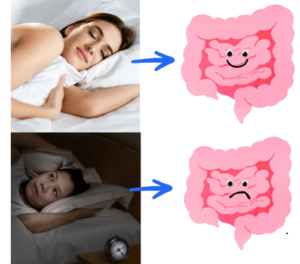Exploring the Essential Link Between High-Quality Sleep and Optimal Digestive Health
Sleep is far more than just a period of rest; it is a vital biological process that significantly influences our digestive health. The complex interplay between sleep and digestion involves a variety of physiological mechanisms that work harmoniously to support our overall wellness. At the heart of this relationship lies the body's circadian rhythm, commonly known as the internal body clock, which coordinates both sleep cycles and digestive functions. This synchronisation is clearly illustrated by the regularity of hunger signals experienced at specific times throughout the day, showcasing the body's remarkable ability to operate in alignment with natural biological rhythms.
Maximising Digestive Health through Restorative Sleep Practices 
Sleep plays an indispensable role in the body's capacity to heal, rejuvenate, and restore its various systems, with particular emphasis on the digestive system. The deeper stages of sleep are especially crucial for these restorative processes, during which the organs, tissues, and cells that comprise the digestive system not only relax but also actively participate in essential repair mechanisms. During these profound stages, the body prioritises cellular repair and growth, with a focus on regenerating the cells lining the digestive tract. Given that these cells endure constant wear and tear from exposure to food particles and digestive enzymes, their regeneration is vital to preserving the integrity of the gastrointestinal lining and enhancing the efficiency of digestion.
Deep sleep also plays a critical role in fortifying the immune system, which is particularly pertinent for the digestive system as it houses specialised immune cells activated by the beneficial bacteria residing in the gut. These immune cells are essential for protecting the gut and the entire digestive system from harmful pathogens, ensuring a balanced population of bacteria within the gut microbiome.
Furthermore, the organs within the digestive system are crucial for detoxification, which involves the elimination of waste and harmful substances from the body. Deep sleep optimises this detoxification process by enhancing the efficiency of the liver and kidneys, enabling these vital organs to function at their highest capacity. The synergistic relationship between sleep and detoxification is a significant contributor to promoting overall digestive health and well-being.
Examining the Impact of Sleep Patterns on Gut Motility
A key element of digestion is the effective movement of food and waste through the digestive tract, a process known as gut motility. This process experiences significant alterations during sleep. Throughout both deep and light sleep, the rate of gut motility decreases considerably. This reduction is a necessary adaptation that allows the digestive system to conserve energy, which can then be redirected towards repairing digestive tissues. By conserving energy in this manner, the digestive process is better equipped to operate more effectively during waking hours, thereby optimising both nutrient absorption and waste elimination.
The migrating motor complex is a sequence of contractions that takes place during fasting periods, including during sleep. This cycle is essential for maintaining gut motility, as it effectively removes food particles and residues that may linger in the digestive system. This natural cleansing mechanism of the digestive tract reduces the risks of bacterial overgrowth, thereby fostering a healthy gut environment. Notably, the migrating motor complex is most actively engaged during the night when individuals are fasting and asleep, highlighting the critical importance of sleep in sustaining the health of the digestive system.
As dawn approaches, gut motility gradually increases, effectively preparing the digestive system to efficiently process and digest food. This rise in motility can also trigger the first bowel movement of the day, showcasing the finely tuned relationship between sleep and gut motility. Understanding this connection is essential for optimising digestive health and enhancing overall well-being.
Examining Hormonal Influences on Sleep Quality and Digestive Function
Ghrelin, often referred to as the hunger hormone, plays a pivotal role in stimulating appetite. Conversely, leptin communicates to the brain that the stomach is full, helping to prevent overeating. Together, these hormones are essential for appetite regulation; however, their functions can be adversely impacted by insufficient sleep.
Even a single night of inadequate sleep can result in elevated levels of ghrelin, which can increase appetite and often trigger cravings for carbohydrates. This phenomenon is frequently described as feeling ‘hangry’. Compounding this issue, leptin levels may decrease following a night of insufficient sleep, disrupting signals that indicate fullness. This creates a challenging scenario where individuals may overeat and find it difficult to recognise their body's signals to stop eating. While occasional poor sleep may not have severe consequences, chronic insomnia can lead to significant digestive complications, including gut inflammation, liver disorders, gastroesophageal reflux disease, inflammatory bowel disease, and even colorectal cancer, along with contributing to weight gain.
The Consequences of Sleep Disruption on Digestive Health
Disruptions to sleep can lead to a multitude of digestive issues. Factors such as shift work, particularly night shifts, and experiencing jet lag can significantly disrupt sleep patterns and upset the body’s internal clock. Additionally, consuming food late at night or maintaining irregular meal times can adversely affect the quality of sleep. The circadian rhythm that governs sleep is intrinsically linked to natural sunlight, which plays a crucial role in sustaining a healthy sleep-wake cycle.
Unfortunately, in today's technology-driven world, many individuals find themselves spending the majority of their daytime indoors, resulting in reduced exposure to natural light. This shift has led to increased exposure to blue light emitted by devices such as laptops, televisions, and smartphones, further disrupting the sleep cycle and sleep patterns, especially when this exposure occurs shortly before bedtime.
The cumulative effects of these factors can result in serious digestive issues, including diarrhoea, ulcers, inflammatory bowel disease, or disturbances in the delicate balance between beneficial and pathogenic bacteria in the gut. This imbalance can also compromise the integrity of the gut lining, exacerbating challenges related to digestive health.
Improving Microbiome Health Through Quality Sleep Habits
Microbiome refers to the trillions of microorganisms residing in the gut, primarily consisting of beneficial bacteria known as probiotics, as well as viruses, fungi, and potentially harmful bacteria. These microorganisms are critical not only for overall health but also for digestive health. They enhance the immune response and assist in digestion, promoting the production of specific vitamins, enzymes, hormones, and amino acids. Recent studies have identified a substantial connection between the microbiome and sleep, revealing that disrupted sleep or chronic insomnia can unfavourably affect the balance of these microbes, ultimately impacting digestive health and overall well-being.
Deciphering the Complex Interactions Between Microbiome Health and Sleep Quality
The relationship between sleep and microbiome health is intricate and multifaceted. Poor sleep can adversely affect microbiome health, while an imbalanced microbiome can also negatively influence sleep quality. To understand this complex relationship, one study indicated a correlation between a higher abundance of certain bacterial types in the gut and quicker sleep onset, as well as fewer night awakenings. Although this article cannot delve into all findings, the key takeaway is that cultivating a diverse and thriving population of beneficial bacteria in the gut is crucial for achieving optimal sleep, efficient digestion, and the maintenance of overall health.
Exploring the Interconnections Between Stress, Sleep, and Digestive Health
Stress and anxiety frequently result in disrupted sleep. Conversely, these mental health challenges can also adversely affect the physical health and functioning of the digestive system. Such disruptions can lead to altered gut motility and contribute to complications such as indigestion, ulcers, and irritable bowel syndrome. A significant factor in this dynamic is the impact of the so-called stress hormone, cortisol.
Examining How Cortisol Influences Digestive Processes
When cortisol levels rise, the body enters a fight-or-flight state. This physiological reaction redirects blood flow to critical areas such as the heart, brain, lungs, and muscles, while reducing circulation to the digestive system. This response prepares the individual to either confront danger or flee, a reaction that was essential for survival in prehistoric times.
In contemporary contexts, however, stressors are often less life-threatening and may include financial concerns, workplace pressures, or inadequate sleep. While temporary redirection of blood flow can be beneficial in acute situations, chronic stress can have detrimental effects on the digestive system, particularly regarding gut motility. This can manifest as symptoms like constipation, diarrhoea, indigestion, gas, and bloating. Therefore, implementing effective stress management strategies is vital for supporting both gut health and achieving restorative sleep.
Prioritising adequate sleep is essential for sustaining a healthy digestive system, as the relationship between sleep and digestion is inherently interconnected. Emphasising effective sleep hygiene practices is crucial for achieving restorative sleep. This includes minimising exposure to blue light from electronic devices, maintaining a consistent sleep schedule, creating a cool, dark sleeping environment, avoiding food intake within two hours before bedtime, and ensuring exposure to natural light during the day, particularly in the morning.
References
Understanding Digestive Health and Circadian Rhythms
Exploring Sleep Dysfunction and Digestive Conditions
Examining the Link Between the Gut Microbiome and Sleep
Investigating Stress and Its Effects on the Digestive System
The Article: How Sleep Affects Your Digestive System appeared first on https://janestevensnutrition.com
The Article: Sleep’s Impact on Your Digestive System Explained appeared first on https://janestevens.net
The Article Sleep’s Impact on Digestive Health Explained Was Found On https://limitsofstrategy.com
The Article Sleep’s Impact on Digestive Health Uncovered found first on https://electroquench.com

